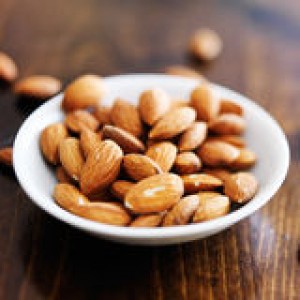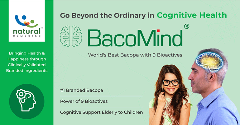News
Study: almonds beneficial for heart disease
19 Jan 2015A new study published in the Journal of the American Heart Association found that a daily snack of 42 grams of almonds instead of a high-carbohydrate muffin with equivalent calories, consumed as part of an overall healthy diet, improved a number of heart disease risk factors in study participants. In addition to significantly improving LDL and total […]

 A new study published in the Journal of the American Heart Association found that a daily snack of 42 grams of almonds instead of a high-carbohydrate muffin with equivalent calories, consumed as part of an overall healthy diet, improved a number of heart disease risk factors in study participants. In addition to significantly improving LDL and total cholesterol, snacking on almonds instead of muffins also reduced central adiposity (belly fat); all three are well-established heart disease risk factors.
A new study published in the Journal of the American Heart Association found that a daily snack of 42 grams of almonds instead of a high-carbohydrate muffin with equivalent calories, consumed as part of an overall healthy diet, improved a number of heart disease risk factors in study participants. In addition to significantly improving LDL and total cholesterol, snacking on almonds instead of muffins also reduced central adiposity (belly fat); all three are well-established heart disease risk factors.
Although heart disease remains the number one cause of death worldwide, it is estimated that at least 80% of premature deaths from cardiovascular disease can be avoided if diet and lifestyle risk factors are controlled. While a large body of evidence has demonstrated that almond consumption is associated with improved heart health, this is the first and largest controlled feeding study using identical diets (with the exception of almonds vs. a calorie matched snack) to investigate and isolate the cardio-protective properties of almonds beyond their contributions to an overall heart-healthy diet. The findings are also the first of their kind to show benefits of eating almonds in terms of reducing body fat – specifically abdominal and leg fat. Reducing abdominal fat is of particular benefit given its connection to metabolic syndrome and increased risk for heart disease.
The twelve-week randomized, controlled clinical study, led by researchers at Penn State University (US), was conducted in 52 overweight, middle-aged adults who had high total and LDL cholesterol but were otherwise healthy. Participants ate identical cholesterol-lowering diets with the exception of a daily snack of either 42 grams of whole natural almonds or a banana muffin, which provided an equivalent number of calories. Participants were provided all meals and snacks in amounts based on their calorie needs to maintain body weight, and followed each diet for six weeks.
The diet containing the almond snack, compared to the muffin snack, decreased total cholesterol, LDL-cholesterol, non-HDL-cholesterol, and remnant lipoproteins. In addition, the diet with the muffin snack reduced HDL (good) cholesterol more than the almond diet.
Despite no differences in body weight or total fat mass, the almond diet significantly reduced abdominal fat mass, waist circumference and leg fat mass, compared to the diet with the muffin snack.
“The study found that substituting almonds for a high-carbohydrate snack improved numerous heart health risk factors, including the new finding that eating almonds reduced belly fat,” said Claire Berryman, PhD and lead researcher of the study. “Choosing almonds as a snack may be a simple way to help fight metabolic syndrome and cardiovascular disease.”
This study joins nearly two decades of research which shows that almonds can help maintain a healthy heart and healthy cholesterol levels, and provides new evidence showing that regularly eating almonds instead of a high-carbohydrate snack may have benefits on body composition. Previous studies showed that regular almond consumption did not lead to significant changes in body weight, indicating that nutrient-rich almonds can be incorporated in weight-maintenance and weight-loss diets.
Related news

Has ‘clean’ had its day?
22 Dec 2025
Wielding clean-label positioning and fortification as marketing levers is a dangerous strategy, and brands would be better off explaining the hows and whys of the ingredients in their products, say experts.
Read more
Celebrating the winners of the Fi Europe Innovation Awards 2025
3 Dec 2025
Food industry stakeholders celebrated as the winners of the Fi Europe Innovation Awards were announced at a ceremony in Paris.
Read more
Alternative protein startups pivot to B2B ingredients amid funding shift
27 Nov 2025
Alt protein startups are pivoting from consumer meat analogues to high-value B2B ingredients, driven by stronger investor interest, better margins, and clearer commercial pathways.
Read more
Walmart Marketplace’s record growth prompts search for UK sellers
26 Sep 2025
Walmart’s third-party e-commerce platform, Marketplace, has witnessed extraordinary growth – but a need for more product diversity has prompted the retailer to recruit UK sellers.
Read more
The winners of Vitafoods Europe Startup Challenge 2025 revealed
29 May 2025
Four startups – Yomio Drops, PFx Biotech, Revobiom, and Favamole – took top prizes at this year’s Vitafoods Europe Startup Challenge awards.
Read more
East takes on West in the fight for future food flavours
30 Apr 2025
Asian and South American flavours are now key components on global menus, driven by a growing global appetite for culinary mashups.
Read more
Food companies urged to bring ‘joy’ and urgency to healthy food mission
14 Mar 2025
For too long, businesses have treated health and sustainability as separate agendas – but there is growing evidence to show diets that benefit human health can also enhance that of the planet, say experts.
Read more
Entries open for inaugural Vitafoods Europe Innovation Awards
29 Jan 2025
Entries are open for the inaugural Vitafoods Europe Innovation Awards, celebrating the ingredients, finished products, partnerships, and initiatives redefining the nutraceutical landscape.
Read more
Paris Olympics: Food and beverage brands champion health, fun, and sustainability
5 Aug 2024
Food and beverage brands are aligning with the Paris Olympics 2024 Food Vision, which emphasises sustainability, local sourcing, and plant-based diets.
Read more
Natural Remedies: Bringing health and happiness via validated branded ingredients
18 Apr 2024
Natural Remedies is an internationally renowned botanical healthcare company committed to advancing the field through rigorous research and the development of clinically validated Branded Ingredients. Guided by our foundational principle of ‘BEING USEF...
Read more